 What Is a License Plate Reader and Can Police Track You Using It?
What Is a License Plate Reader and Can Police Track You Using It?
Table of Contents
- North Carolina License Plate
- North Carolina License Plate Design and Formats
- North Carolina Vanity License Plate
- Most Popular North Carolina Special Plate Numbers
- North Carolina License Plate Lookup
- What Do I Need to Get a License Plate in North Carolina?
- Differences Between a Passenger License Plate and Commercial License Plate in North Carolina
- How To Renew License Plate in North Carolina
- How To Transfer a License Plate in North Carolina
- North Carolina License Plate Lookup Frequently Asked Questions (FAQ)
 North Carolina License Plate
North Carolina License Plate
A North Carolina license plate is a metal tag with alphanumeric characters attached to a vehicle, indicating that the vehicle is registered with the relevant state agency. License plates serve as official vehicle identifications and are typically linked to information about the vehicles to which they are registered and their owners. The numbers imprinted on the plates help law enforcement and other people easily identify vehicles.
All motor vehicles in North Carolina must have official identification tags (license plates) obtained from the state's Division of Motor Vehicles (DMV). Per Section 20-63 of the state's General Statutes, the NCDMV must issue a registration plate to the owner of a trailer, semitrailer, motorcycle, and every other motor vehicle upon registering their vehicle. North Carolina required two license plates in the past. However, in 1951, the state's general assembly amended Section 20-36 of the North Carolina General Statutes to permit the DMV to issue only rear plates in case of a metal shortage. After a while, the amendment was re-amended to allow the DMV to issue rear license plates only, regardless of metal availability. As of 2024, North Carolina is one of the states that require only one license plate for registered vehicles on the rear.
The North Carolina Division of Motor Vehicles issues various types of license plates, including the following:
- Standard License Plates - These are issued for all vehicles registered in North Carolina, and they are available in three designs, namely:
- First in Freedom Plates - These plates recognize two critical North Carolina milestones in the American Revolution. They are mostly issued for private passenger motor vehicles and private hauler vehicles licensed for no more than 6,000 lbs
- National and state motto Plates -
- First in Flight Plates - These plates design monumentalize the Wright Brothers' first powered flight in 1903 at Kitty Hawk, North Carolina - These standard license plates carry both the North Carolina motto (To Be Rather Than To Seem) and the United States motto (In God We Trust)
- Personalized License Plates - These plates allow interested individuals to personalize special and standard license plates. However, personalizing license plates comes at an additional fee
- Specialty License Plates - These license plates feature plate designs representing over 100 interest groups and causes in North Carolina
- Disability Placards and License Plates - These are plates issued for vehicle owners in North Carolina who require parking assistance and are certified as having any of the following:
- Having mobility issues caused by defective vision, cardiac, lung disease, neurological, orthopedic, neurological, or arthritic conditions
- Unable to walk without help
While North Carolina license plates bear alphanumeric characters, they do not follow a particular order. The type of standard license plate issued for a private passenger vehicle or a private hauler vehicle licensed for no more than 6,000 lbs is at the instance of the vehicle owner. Per state law, a vehicle owner must keep their license plates clean and free from dirt and dust. Anyone who refuses to clean their registration plates after being warned to do so is guilty of a Class 3 misdemeanor. It is also illegal to conceal or alter a North Carolina license plate by any means. Any vehicle owner who willfully alters or conceals their registration plate is guilty of a Class 2 Misdemeanor.
 North Carolina License Plate Design and Formats
North Carolina License Plate Design and Formats
North Carolina license plates come in varying designs depending on the plate type, but most of them have a white background with a touch of blue. Also, there is no specific order or number of characters of the alphanumeric plate numbers written on the tags. For instance, the First in Freedom license plate design has two different dates, May 20, 1775, and April 12, 1776, at the top of the plate, recognizing two important events: the signing of the Mecklenburg Declaration of Independence and the Halifax Resolves, respectively. These events were the first steps toward independence from Great Britain during the early phase of the American Revolution.
Another state-issued standard license plate, the National and State motto plate, includes the North Carolina motto, "To Be Rather Than To Seem", and the United States motto, "In God We Trust". The "In God We Trust" inscription is printed on top of the license plate above all other characters, while the state motto is written on the bottom, just before the state's name in upper case letters, "NORTH CAROLINA". Other types of license plates issued by the state's DMV come in various designs, and some include logos or pictures depicting the cause or special interests for which they are designed.
Standard License Plates
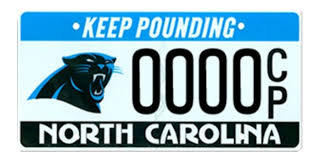
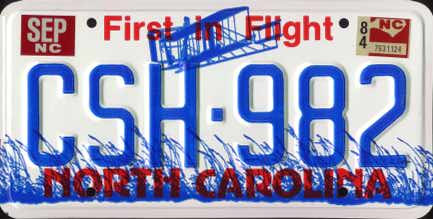
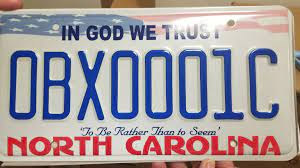
Specialty License Plates
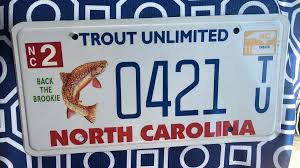
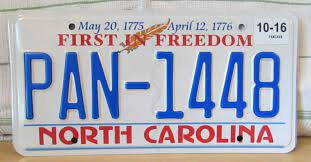
 North Carolina Vanity License Plate
North Carolina Vanity License Plate
North Carolina vanity license plates, otherwise known as personalized license plates, allow interested persons to personalize special and standard license plates for an additional fee. They get to select their preferred license plate numbers in compliance with certain DMV rules. The North Carolina DMV has discretion in refusing to issue a vanity plate number request with an offensive word or meaning.
You can order a North Carolina personalized license plate in person, online, or by mail. To apply by mail, complete the Application for Personalized License Plates Form and mail it to the state's DMV at:
North Carolina Division of Motor VehiclesSpecialized and Personal Plates
3155 Mail Service Center
Raleigh, NC 27697-3155
To order a North Carolina vanity license plate online, use the myNCDMV Portal powered by PayIt and select the "Order a Special or Personalized Plate" tab. Expect to pay a $3 fee per online transaction to PayIt when you use this online service. You can also apply for a North Carolina personalized license plate in person by submitting a completed Application for Personalized License Plates Form at any NC DMV Office location.
Vanity license plates can be issued for private trucks, automobiles, motorcycles, commercial vehicles, and trailers registered in North Carolina at a $30 fee. Generally, you need your current vehicle license plate number and the last five digits of the title number to order a North Carolina license plate. Before filing your application, you can look up your preferred plate number to ascertain whether another person has not taken it. Once the DMV receives your application for a personalized license plate, it takes up to eight weeks for the Division to process it and send your plate.
 Most Popular North Carolina Special Plate Numbers
Most Popular North Carolina Special Plate Numbers
The following are some of the most popular specialty license plates in North Carolina:
- Gold Star Lapel Button plate
- Eagle Scout plate
- Fire Department or Rescue Squad plate
- Prince Hall Masons plate
- Amateur Radio Operators plate
- Retired Law Enforcement Officer plate
- Scuba plate
- Support Our Troops plate
- Animal Lovers plate
- Blue Ridge Parkway Foundation plate
- War on Terror plate
- Vietnam Veteran plate
- Collegiate plate
- Breast Cancer Awareness plate
- Military Retired plate
 North Carolina License Plate Lookup
North Carolina License Plate Lookup
North Carolina license plate lookup means searching for certain information about any vehicle registered with the state's Division of Motor Vehicles (DMV). A typical license plate number search uses a vehicle's plate number and a state's name to check for details associated with the vehicle. North Carolinians may want to look up license plates for many reasons, including researching a used vehicle's history for those intending to purchase one. However, plate number searches must be done by authorized entities, including certain law enforcement agencies.
A North Carolina license plate lookup can reveal the following information about a vehicle:
- Make, model, and year of the vehicle
- Engine capacity
- Registration history
- Inspection history
- Flood damage
- Accident history
- Maintenance history
- Repossession records
- Odometer readings
- Sales history
- Mileage rollback
- Vehicle theft alert (if it has been reported and listed as a stolen car)
The North Carolina DMV permits qualified individuals and entities, including law enforcement agencies, to search the state's motor vehicle records (MVR) by completing Form MVR-605A. Such authorized persons and organizations can look up a vehicle's full history with its license plate number through this service. However, it is not free and comes at a cost. Alternatively, it is possible to look up a North Carolina license plate on Recordsfinder using a vehicle's plate number and the state.
North Carolina Reverse License Plate Number Search
The reverse license plate number search service offered by Recordsfinder can get an authorized person or entity the required data about any North Carolina-registered vehicle. The website eliminates the bottlenecks in obtaining certain records of vehicles, saves time, and turns out accurate data on any license plate being searched. All that is required to do a reverse plate lookup is a correct license plate number and the state's name.
 What Do I Need to Get a License Plate in North Carolina?
What Do I Need to Get a License Plate in North Carolina?
The first step to obtaining a North Carolina license plate for a vehicle is to title and register it with the state's Division of Motor Vehicles. You must meet the following requirements and provide certain documents to title and register a vehicle and, by extension, secure a license plate in North Carolina:
- A valid North Carolina driver's license. A new resident in the state can provide a valid out-of-state driver's license and their North Carolina Temporary Driving Certificate
- Notarized signatures of all owners on required documents if more than one person owns the vehicle and copies of the alternate owner's valid ID or driver's license. Alternatively, a Power of Attorney can sign on behalf of the vehicle's co-owners
- Proof of a North Carolina liability insurance
- Required forms and documents -
- For a vehicle purchased from a dealer:
- Completed Title Application Form (MVR-1)
- Completed Damage Disclosure Statement Form (MVR-181)
- Completed Odometer Disclosure Statement Form (MVR-180)
- Vehicle title
- For a vehicle bought from an individual, gifted, or donated -
- Completed Title Application Form
- Vehicle title
- Lien release if liens are shown on the title
- Completed Damage Disclosure Statement Form
- Completed Odometer Disclosure Statement Form
- Completed Highway-Use Tax Exemption Certificate Form (MVE-613) if the vehicle is being transferred between relatives
- Any other required form, depending on the vehicle type
- For a vehicle purchased from a dealer:
The manufacturer's certificate of origin is the official transfer document for a new vehicle. North Carolina residents who purchase vehicles already registered in the state, or those new in the state must provide the certificate of title correctly assigned by the vehicle's former owner. To complete a vehicle titling and registration and obtain a license plate in North Carolina, submit all the required documents in person at any NCDMV office. Alternatively, you can mail them to the state's DMV at:
North Carolina Department of Motor VehiclesVehicle Titles/Liens, Duplicate Registration
3148 Mail Service Center
Raleigh, NC 27697-3148
When getting a license plate for the first time in North Carolina, you must visit a DMV license plate agency (any DMV office location). The cost of license plates in the state varies, depending on the vehicle type being plated. In addition, there are counties that take local and regional transportation taxes on some vehicles.
 Differences Between a Passenger License Plate and Commercial License Plate in North Carolina
Differences Between a Passenger License Plate and Commercial License Plate in North Carolina
A passenger license plate is typically for personal use, while a commercial license plate is mainly assigned to vehicles meant for business or commercial use. Passenger license plates are mostly issued for vehicles used for personal transportation. On the other hand, commercial license plates go on vehicles such as buses, delivery trucks, taxis, and other vehicles designed for transporting people and goods. The notable differences between a passenger license plate and a commercial license plate in North Carolina are outlined in the table below:
| Features | Passenger License Plate | Commercial License Plate |
|---|---|---|
| Vehicle type | Vehicles owned by individuals with a gross weight of less than 10,000 lbs and not used for commercial purposes but personal use | Primarily vehicles with Gross Vehicle Weight Rating (GVWR) of at least 10,001 lbs that are used as a part of a business and cross state lines. Under North Carolina law, any vehicle carrying hazardous materials and certain passenger vehicles are considered commercial vehicles, regardless of the gross weight. They include vans, single trucks, and combination vehicles like trucks pulling other equipment and tractor-trailers |
| Special Inscription | They are made with no special inscriptions unless issued as special license plates. Users have the option to choose either a "First in Freedom", First in Flight", or the "National/State Mottos" plate | Most commercial license plates on vehicles weighing 26,001 pounds or more in the state bear the word "Commercial" unless they are issued as special plates |
The requirements for getting a passenger license are largely the same as those for a commercial license plate in North Carolina, and the processes for obtaining them are similar. For instance, they are issued after vehicle owners have titled and registered their vehicles. In North Carolina, vehicle registration and license plate fees vary based on vehicle weight. Hence, registering and obtaining a commercial vehicle is potentially more expensive than a passenger vehicle.
 How To Renew License Plate in North Carolina
How To Renew License Plate in North Carolina
License plates issued in North Carolina expire yearly and must be renewed annually. Typically, the North Carolina Division of Motor Vehicles (DMV) will notify you of the impending expiration of your vehicle registration and, by extension, license plate about 60 days before it expires. The Division does this by mailing a renewal notice to a vehicle's owner address maintained in its database. The renewal notice will list the renewal fee and the vehicle property taxes due, if any.
Unless your vehicle qualifies for a waiver, North Carolina requires vehicles to undergo safety and/or emissions inspection at most 90 days before their license plates expire. This is a key requirement for vehicle registration renewal in the state. Additionally, the liability insurance maintained on the vehicle must be active.
You can renew your North Carolina license plate/vehicle registration using any of the following methods:
- Online through the myNCDMV portal - Login to your online account, select registration renewal and pay the amount indicated. You need the last five digits of your vehicle title number and your vehicle's license plate number (both are listed on the renewal notice) to complete this request
- In-person by visiting any North Carolina DMV office location with your renewal notice (not necessarily required) and provide your vehicle's valid proof of insurance and license plate number
- By mailing your renewal notice and valid proof of North Carolina insurance to the state's DMV at:
Registration Renewals
P.O. Box 29620
Raleigh, NC 27626
 How To Transfer a License Plate in North Carolina
How To Transfer a License Plate in North Carolina
North Carolina permits the transfer of a license plate from one vehicle (old) to another (new)owned by the same person. However, it is important to satisfy the following requirements to transfer a North Carolina license plate:
- The new vehicle must have a current inspection
- Both vehicles must have liability insurance (with proof) from an insurance provider licensed to operate or do business in the state
- The name on the new vehicle's title must match the applicant's name
- The license plate must be valid
If you meet all of these requirements, you can visit any New Carolina DMV license plate agency to transfer a license plate from your old vehicle to a new vehicle and pay a $21.50 fee. However, this fee may be waived if a vehicle already has a North Carolina title and the following holds:
- When the registered owner is deceased, and the title is transferred to the surviving spouse
- When assigning vehicle ownership of a vehicle from joint ownership to single ownership, and one of the names is the same
- When ownership of a vehicle is being transferred from single ownership to joint ownership and one of the names is the same
 North Carolina License Plate Lookup Frequently Asked Questions (FAQ)
North Carolina License Plate Lookup Frequently Asked Questions (FAQ)
Can I Get a Replacement for My Lost License Plate in North Carolina?
Yes, lost vehicle license plates can be replaced in North Carolina. You can request a replacement license plate in the state by completing an Application for Replacement Plate and/or Sticker Form (MVR-18) at any North Carolina DMV license plate agency. In addition to Form MVR-18, you will need to provide proof of liability insurance from a North Carolina insurance provider or any other licensed to do business in the state and your vehicle insurance policy number. Expect to pay a $21.50 fee when requesting a replacement license plate in North Carolina.
What Do Police See When They Run Your License Plates in North Carolina?
Officers of law enforcement agencies in North Carolina, including the police, typically see the following information about vehicles and their owners when they run license plates in the state:
- Information about registered owners
- Warrants and investigations
- Registration status
- Whether the vehicle is stolen or wanted
- Driving history and criminal history of vehicle owners
- Vehicle insurance status
- Outstanding tickets
- License plate numbers
What is the Penalty for Driving with An Expired License Plate in North Carolina?
A North Carolina vehicle registration typically expires yearly but has a "valid through" date, which is 15 days after the expiry date. Consequently, vehicle owners in the state whose license plates have expired may lawfully drive their vehicles up to 15 days after the due dates. Per Section 20-111 of the North Carolina Statutes, driving with an expired license plate/vehicle registration in the state is a Class 3 misdemeanor, and you may be charged to court. This also applies to operating a vehicle with an expired temporary license plate.
The North Carolina Department of Motor Vehicles charges offenders up to a $25 late fee on every registration renewal done after the expiry date of vehicle registrations. In essence, if you renew your license plate within a month of its expiration date, the DMV will charge you a $15 late fee. Similarly, you will pay $20 for a license plate that has expired within one to two months and $25 if your vehicle renewal registration has lapsed for two or more months. If a vehicle's registration has expired for over six months, law enforcement may impound or tow the vehicle. The owner of such a vehicle will only regain possession of the car once they renew their license plate and pay the necessary fines.
Do I Need to Return License Plates in North Carolina?
Yes. You may be required to return your license plates in North Carolina for many reasons. For instance, if you are wrecking or dismantling a vehicle, state law requires you to return the proof of ownership and the last license plates issued to the DMV unless you intend to transfer the plate to another vehicle. Similarly, anyone selling their vehicle for reasons beyond their control, like going bankrupt, must remove their registration plates and forward them to the North Carolina DMV. Furthermore, returning your vehicle license plate to the state's DMV is important before canceling your liability coverage if you want to store the vehicle for a long period. You may incur a civil penalty if you cancel your vehicle liability insurance before surrendering the license plate.
If you have relocated outside North Carolina and established a permanent residence in your new state, you must return your license plate and driver's license to the state's DMV. North Carolina license plates can be returned in person at any DMV license plate agency location by mail or by mail to:
DMV Vehicle Registration SectionRenewal Title and Plate Unit
3148 Mail Service Center
Raleigh, NC 27697-3148
Alternatively, you can surrender a North Carolina license plate by dropping it off in a drop box located at North Raleigh License Plate Agency, 4121 New Bern Ave., Suite 151, Raleigh.
Can I Keep my North Carolina License Plate if I Move to Another State?
No. You must surrender your North Carolina license plate to the state's Division of Motor Vehicles once you permanently relocate to another state and establish residency. Typically, state law requires liability insurance from a state-licensed insurance provider on any registered vehicle as long as the owner keeps the North Carolina license plate. As a result, a vehicle owner will incur a civil penalty if they choose to cancel liability insurance or fail to maintain continuous coverage while still keeping the plates.
What Size are License Plates in North Carolina?
A typical North Carolina license plate measures 12" x 6". Motorcycle license plates are smaller and are generally 7" x 4" in dimension.
How Long Can You Drive with Temporary License Plates in North Carolina?
The North Carolina Division of Motor Vehicles may issue a temporary license plate for a vehicle for a validity period set by the division, usually between 10 and 60 days. Temporary license plates in the state are generally issued to allow a person to drive their vehicle for inspection or while waiting to process their vehicle registration. These plates become void once vehicle owners receive their annual registration plates or upon the expiration of the temporary registrations.
What Are the Steps to Renew License Plates in North Carolina?
Renew your North Carolina license plates using any of the following methods:
- In-Person Renewal Application
- Visit a North Carolina DMV license plate agency
- Present your renewal notice and proof of vehicle insurance
- Pay the required fees
- Online Renewal Application
- Log on the myNCDMV Portal
- Select the "Renew Registration" tab
- Provide your license plate number, title number (the last 5 digits), and any other required information
- Pay the required fees
- Mail Renewal Application
- Package your proof of North Carolina liability insurance coverage, renewal notice, and proof of renewal application fee in an envelope
- Mail the envelope to the DMV at:
Registration Renewals
P.O. Box 29620
Raleigh, NC 27626
What Do I Do if My License Plate is Lost or Stolen in North Carolina?
Take the following steps if your North Carolina license plate gets stolen or lost:
- Report to law enforcement (not necessarily required but can be done for security purposes)
- Complete the Application for Replacement Plate Form (Form MVR-18)
- Complete the License Plate Turn In Verification Form (Form MVR-18A) for lost or stolen license plate
- Submit these forms in person at any North Carolina DMV license plate agency and pay a $21.50 license plate replacement fee




